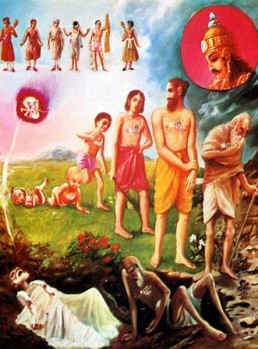Swami Chinmayananda Commentary
That which is born must die and after death things are born again. Here, Krishna continues to view the whole situation from the materialist angle. The materialists take life to be a constant flood of appearances of forms, arising from nowhere, and disappearing into nowhere. The theists believe that the embodiments are taken up by the individual-ego in order that it may eke out its experiences and learn to grow in its understanding of life and ultimately realise the Truth behind it all. Thus, this is a comon meeting point of both the theists and the atheists; that both of them believe life to be a continuous chain of birth and death.
Thus, if life, be, in its very nature, a stream of births and deaths, against this inevitable arrangement, no intelligent man should moan. Standing out in the blazing summer sun, one must, indeed, be stupid to complain against its heat and glare. Similarly, having come to life, to complain against the very nature of life is, indeed, an inexcusable stupidity.
On this score also, to weep is to admit one’s own ignorance. Krishna’s life, is, on the whole, a message of cheer and joy. His doctrine of life is an insistence upon, “to weep is folly and to smile is wisdom.” “Keep smiling” seems to be Krishna’s philosophy put in two words, and that is why, seeing his dear friend weeping in life, the Lord gets whipped up, as it were, to an enthusiasm to save Arjuna from his delusions, and bring him back to the true purpose of life.
THE FOLLOWING TEN VERSES GIVE THE COMMON-MAN’S VIEW. SHANKARA SAYS, “NEITHER IS IT PROPER TO GRIEVE OVER BEINGS WHICH ARE MERE COMBINATIONS OF (MATERIAL) CAUSES AND EFFECTS; FOR”:
Adi Sankara Commentary
This being so, ‘death of anyone born’, etc. Hi, for; mrtyuh, death; jatasya, of anyone born; dhruvah, is certain; is without exception; ca, and mrtasya, of the dead; janmah, (re-) birth; is dhruvam, a certainly. Tasmat, therefore, this fact, viz birth and death, is inevitable. With regard to that (fact), apariharye, over an enevitable; arthe, fact; tvam, you; na arhasi, ought not; socitum, to grieve.
The Bhagavad Gita with the commentary of Sri Sankaracharya – Translated by Alladi Mahadeva Sastry
Holy Geeta – Commentary by Swami Chinmayananda
The Bhagavad Gita by Eknath Easwaran – Best selling translation of the Bhagavad Gita
The Bhagavad Gita – Translation and Commentary by Swami Sivananda
Bhagavad Gita – Translation and Commentary by Bhaktivedanta Swami Prabupadha
Srimad Bhagavad Gita Chapter 2 – Verse 27 – 2.27 jatasya hi dhruvo – All Bhagavad Gita (Geeta) Verses in Sanskrit, English, Transliteration, Word Meaning, Translation, Audio, Shankara Bhashya, Adi Sankaracharya Commentary and Links to Videos by Swami Chinmayananda and others – 2-27

